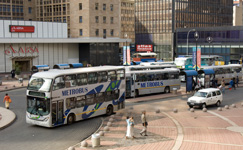South Africa is top for affordable financial services
26 August 2015
South Africa ranks second for its excellent access to and usage of affordable
financial services, according to a report released yesterday.
The 2015 Brookings Financial and Digital Inclusion Project (FDIP) Report and
Scorecard, which evaluated 21 countries, examined broad dimensions relevant to
financial inclusion such as country commitment, mobile capacity, regulatory
environment and adoption of traditional and digital financial services.
As of 2014, about 75% of South African adults had bank accounts and 5% used
non-bank financial products. ATM and debit cards were more common, with 34% of
the banked population owning a South African Social Security MasterCard.
"Unlike in many other countries in our study, women in South Africa are
generally not disproportionately excluded from formal financial services," the report
said. "The 2014 Global Findex found that about 69% of men and 69% of women had
accounts with a formal
financial institution or mobile money provider."
South Africa earned 80% and was ranked number 12 for country commitment,
number one for mobile capacity, number 17 for regulatory environment and number
three for adoption. It also received the highest score for formal account
penetration, including among rural, low-income and female groups.
Strong mobile capacity
South Africa's mobile capacity was strong, the report showed, with the
percentage of unique subscribers comprising about 70% of the population and about
96% 3G mobile network coverage by population.
"South Africa also has a number of mobile money deployments offering P2P
domestic transfers, bill payment, and international remittances," it said. "This has
allowed it to reach more people and engage them in financial services."
Initiatives to digitise government transfers, along with the country's quite
extensive banking infrastructure, supported financial inclusion. "Efforts to
diversify
the digital financial services market and encourage digital transactions could propel
further advancements in financial inclusion."
According to estimates from a recent Imperial College and Citi report, "a 10%
increase in the digital money readiness and commensurate increase in adoption for
the countries included in the index, can help up to an estimated 220 million
individuals enter the formal financial sector. This translates to an additional $1-
trillion (R13.15-trillion) moving from the informal economy to the formal economy".
Financial inclusion
The report said financial inclusion had become a crucial aspect of economic
development.
"Developing economies need consumers who can pay bills or send remittances
in an affordable and convenient manner. Digital services are an increasingly
important component of the nexus between development and financial inclusion.
"Having greater access to financial services promotes
entrepreneurship, lifts
people out of poverty, and gives them greater hope for a brighter economic future.
This is especially the case in regard to women and marginalised groups."
Source: News24Wire
 Unlike many other countries, both men and women make use of financial services in South Africa, where about 69% of men and 69% of women have accounts with a formal financial institution or mobile money provider. (Image: Media Club South Africa)
Unlike many other countries, both men and women make use of financial services in South Africa, where about 69% of men and 69% of women have accounts with a formal financial institution or mobile money provider. (Image: Media Club South Africa)




